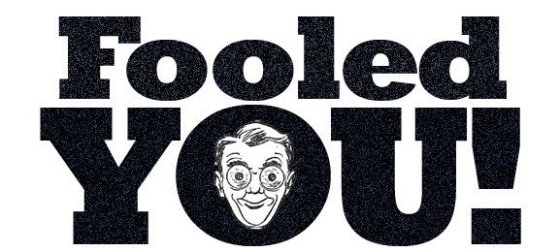People like being fooled by magicians. When we watch a magician we open ourselves up to enjoy the trickery. We accept the premise that this person is about to fool us, prepare ourselves mentally, and get ready to play the game.
When we’re not prepared to be tricked, and we are fooled, we feel like idiots, and that makes us angry. This is quite the opposite response from being tricked by a magician which is usually that of delight. Ironically, before any story is revealed to be a hoax we’re often delighted, intellectually inspired, humored, or even politically agitated. As soon as the story is proven to be a hoax any positive emotion we previously felt often turns into anger.
Recently, there’s been a flurry of high profile hoaxes, with each generating endless social media responses that have stirred up a mountain of controversy and debate. What I also noticed is that all three took advantage of different media to create the reality of the story. For example:
- The Elan Gale story of needling the unreasonable woman who harassed flight attendants to get her home for Thanksgiving: A series of tweets played out in real time with photos of handwritten notes tweeted out throughout the storyline.
- Video of the Google employee who got off the Google bus to yell at a protestor to leave San Francisco if she couldn’t afford to live there: An “in-the-moment” video shot by another media outlet of a protestor being confronted by a Google employee.
- The lesbian waitress whose tip was replaced with a nasty note denouncing her lifestyle: A photo of an “actual” receipt with a handwritten homophobic note.
Not only did we not realize that these elements were fake, but they added to the realism of the story making us believe even more.
Our anger at hoaxes causes us to demand retribution
When these stories are revealed to be hoaxes, almost universally people get unbelievably angry, wanting some retribution they can’t actually have. One comment on the Google protest video hoax stated, “People who pull that kind of shit should be slapped – both with an open hand and figuratively with fines.”
He’s furious because he’s fallen for the hoax, as if it was a virus on his sense of reason.
In a profanity-laden post, Dave Weigel, a political reporter for Slate, slammed Buzzfeed and others for shoddy reporting of the Elan Gale story, and referred to Elan Gale as “one of the worst people on the planet.” The criticism was laid out after the story had been revealed as a hoax. Weigel “oh so smartly” said we should have seen it was a hoax as he watched it play out. If Weigel knew before everyone else that it was a hoax, why wasn’t he the one who exposed it? It’s very easy to tell people you screwed up when all the pieces are laid out in front of you. At that point you don’t need Weigel or anyone else telling you what you did wrong. It’s pretty clear.
Embrace the hoax as an effective means to tell a story, and convey a message
In response to everyone’s reaction to this and other hoaxes, Weigel posted a rather astute tweet:
I’m beginning to think that dumb Internet hoaxes that drive traffic when we cover them are the future of #journalism.
— daveweigel (@daveweigel) December 3, 2013
While Weigel’s tweet was meant to be that of disdain, I see the hoax format of using multiple media as real elements as an incredibly effective means to tell a very believable story that invites delight, discussion, and controversy.
 We saw this play out years ago with LonelyGirl15, a series of supposedly personal videos produced by a teenage girl as told to her webcam and posted on YouTube (read and listen to: “The LonelyGirl15 Model of Interactive Storytelling”). Even after it was discovered that this was a fully produced series, and not the creation of the teenage girl, people still enjoyed the storytelling format of short video snippets via YouTube.
We saw this play out years ago with LonelyGirl15, a series of supposedly personal videos produced by a teenage girl as told to her webcam and posted on YouTube (read and listen to: “The LonelyGirl15 Model of Interactive Storytelling”). Even after it was discovered that this was a fully produced series, and not the creation of the teenage girl, people still enjoyed the storytelling format of short video snippets via YouTube.
What can’t be squelched are the sentiments these hoaxes raise. Even after a story is revealed to be a hoax people still can’t stop debating the issues:
- Elan Gale story: Obnoxious passengers and bullying
- Google protest video: Annoyance of San Francisco’s tech elite
- Lesbian waitress: Homophobia
What I’m discovering is it only takes a little bit of realism to make a story very believable. This is not to say that you need to create a hoax with a lot of fake elements to make a story, but rather you need to focus on the small details, like a receipt, a note, a video of an argument, to make your story that much more believable, and more importantly, to spur a discussion on that topic.
According to a recent article by the NYTimes, those stories that have the highest potential to go viral are actually false. When a hoax goes viral it infuriates us because we’re responsible for its success. It appears people aren’t falling for truth is stranger than fiction but are rather finding fiction rather entertaining on its own merits.
Next time you’re fooled by a hoax, instead of being angry at the hoaxer, look at what they did and what you can learn from it. Could your stories become more realistic with just a few more visual and audible details? Would there be value to telling a story that’s not true? Not every story has to be truthful, and the false ones don’t need to be hoaxes (Read and listen to: “Hacking Media Production: Fiction in Content Marketing”).
Your thoughts?
“Fooled You” image courtesy of the Johnson-Smith catalog of practical jokes from Technologizer.




